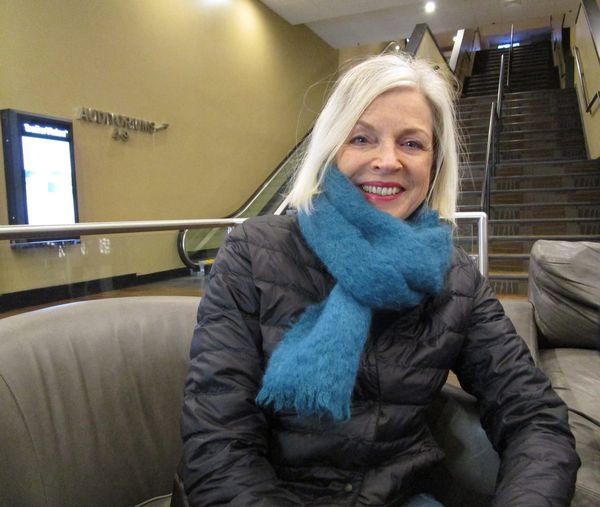 |
| In Body Of Truth Evelyn Schels explores the lives and works of Marina Abramović, Sigalit Landau, Shirin Neshat, and Katharina Sieverding Photo: Anne-Katrin Titze |
As the tenth annual DOC NYC Closing Night selection, Ebs Burnough’s The Capote Tapes (based on audio recordings by George Plimpton of Truman Capote) was screening at SVA Theatre 1, I attended the international première of Evelyn Schels’ Body Of Truth, screening in SVA Theatre 2.
Shot by Börres Weiffenbach (Margarethe von Trotta’s Searching For Ingmar Bergman), edited by Ulrike Tortora (Nina Wesemann’s Kids) and with a score by Christoph Rinnert (Schels’ Georg Baselitz), Body Of Truth explores the lives and work of four artists - Marina Abramovic (present in, among other films, Lisa Immordino Vreeland’s Peggy Guggenheim: Art Addict; Fabien Constant’s Mademoiselle C; Matthew Akers’ Marina Abramovic: The Artist Is Present), Shirin Neshat (Women Without Men, Looking For Oum Kulthum), Sigalit Landau, and Katharina Sieverding.
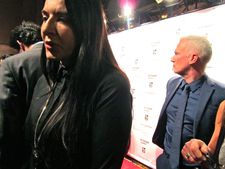 |
| Marina Abramović with Klaus Biesenbach at the Gotham Awards for Marina Abramovic: The Artist Is Present Photo: Anne-Katrin Titze |
At Cinépolis Chelsea, Evelyn Schels and producer Arek Gielnik (Isabella Sandri’s An Uncertain Border, starring Valeria Golino and Cosmina Stratan; Barbara Miller’s #Female Pleasure) met with me for a conversation on Body Of Truth as DOC NYC was coming to a close with encore screenings of festival winners Garin Hovannisian’s I Am Not Alone (Audience Award) Weijun Chen’s City Dream (Viewfinders) and John Carluccio’s Maurice Hines: Bring Them Back (Metropolis) at IFC Center.
Anne-Katrin Titze: I realised watching your film, how much the artworks are related to where and when the bodies of the artists were entering the world.
Evelyn Schels: Exactly.
AKT: The timing and the connection to war.
ES: If, for instance Marina Abramovic was born ten years later, maybe she would never even exist. It's so decisive for her life, for her path and for her development and career, the moment when she was born. The parents - it was a war love story. That means it was under extreme circumstances that they met and fell in love. I think her father was bleeding on the battlefield and the mother saved him and gave him her blood. So it's very dramatic.
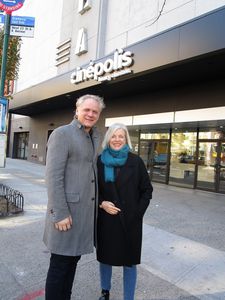 |
| Arek Gielnik and Evelyn Schels in front of Cinépolis Chelsea Photo: Anne-Katrin Titze |
And after the war it was over. And they divorced or did not live together anymore. The reason why Marina had a very difficult relationship to her mother is certainly rooted in those circumstances. Because the mother was unhappy, she didn't want to be left and was jealous. It's very complicated. This is something I really became more and more aware of when I was getting deeper and deeper into the matter. It's so decisive, the moment in the global history, when you are born.
AKT: History is acutely present in the art of all four of your subjects.
ES: When you take Sigalit Landau, this post-Holocaust generation, she's completely traumatised.
AKT: She says in the film that her role was to fill the gap in the family [both of Sigalit’s parents were Holocaust survivors].
ES: Yes, because she wanted to be a healing kind of child. With a difficult mother. She has a difficult relationship with her father, too. [The father spent the first years of his life in a camp.] Into the difficult atmosphere she wanted to bring some light. She was a dancer and that's what she's meaning when she speaks about filling the gap.
AKT: The theme of shoes, on different levels, comes back in the piece she is seen making in Body Of Truth. World history finds its way into Shirin's life in 1979.
ES: Of course. She became an artist. She started to study art in America several years before. But then the father decided to leave her here in the United States alone. And she was a little bit lost. She was Iranian, a difficult nationality being in the States. She was not sure where to go.
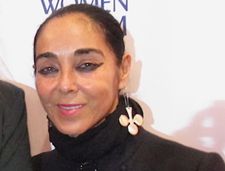 |
| Evelyn Schels on Shirin Neshat: “She made the decisive first body of work, called Women of Allah. And she was an artist. From that moment on.” Photo: Anne-Katrin Titze |
And when she went back, I think in '96, to Iran and she perceived all these changes, that was a kind of emotional shock for her also. And then she made the decisive first body of work, called Women of Allah. And she was an artist. From that moment on.
AKT: Another variation on the theme of filling a gap. Expelled from family, from a place. There is a gap, again, that the art is made around. Which is almost like the navel. The navel, which features so strongly in two other artworks, Sigalit Landau's barbed wire hula hoop and the cutting around the navel that Marina does.
ES: It's the centre of the body. And it's our connection to our mother in the belly.
AKT: These topics and connections all emerge in our heads after the film, which you spent a long time editing.
ES: I am very happy to hear that because this is really something I wanted to achieve with this film - it gives you some motivations and the possibility to put your brain in motion. And your belly and your sentiments and your emotions. This is the point. I don't want to explain anything.
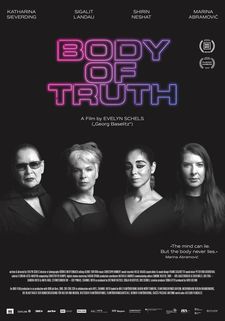 |
| Body Of Truth poster |
AKT: Yesterday after the screening when the question arose in the Q&A about what was the most difficult aspect of making the film, I think you, [to Arek Gielnik] said "editing". I can see the complication of how much you let each artist stand on her own. How much do you draw parallels? How much do you connect these four very different women?
ES: We tried to respect a kind of chronology. So we started really with World War II. It was the first decisive moment in the biographies from Katharina Sieverding and from Marina Abramovic and then you go further and further and the Second World War was also decisive in another way for Sigalit Landau.
AKT: Of course.
ES: Because of the Holocaust. And then you go further and see the developments in Germany, the murder of Benno Ohnesorg.
AKT: In 1967.
ES: During the riots against the Shah. There we have the Shah as symbol for oppression and intolerance to different political opinion. And then you have the story of Shirin, where the Shah is disappearing because people didn't want him anymore and so on.
But then came what came, not a better solution. It was Ayatollah who came. They wanted to have him back from exile in Paris. Also the students, they thought that in this Islamic identity they can find a kind of force. And they considered the Shah being a kind of marionette of the United States because of the oil.
AKT: You start with water. Women walking by water. Not on water.
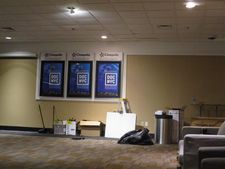 |
| DOC NYC wraps up at Cinépolis Chelsea Photo: Anne-Katrin Titze |
ES: Jesus was a woman, as you heard!
AKT: Exactly. So, what is it with water?
ES: Water is for me something - I only wanted it subcutaneously - water has something to do with birth, with rebirth. We are in water before we came out of the belly of our mothers. Our body is 90% water. All this gave me the idea why not visually connect them with water?
Coming up - Evelyn Schels with Arek Gielnik on more Body Of Truth.
The 10th annual DOC NYC was held on November 6 through November 15, 2019.





















